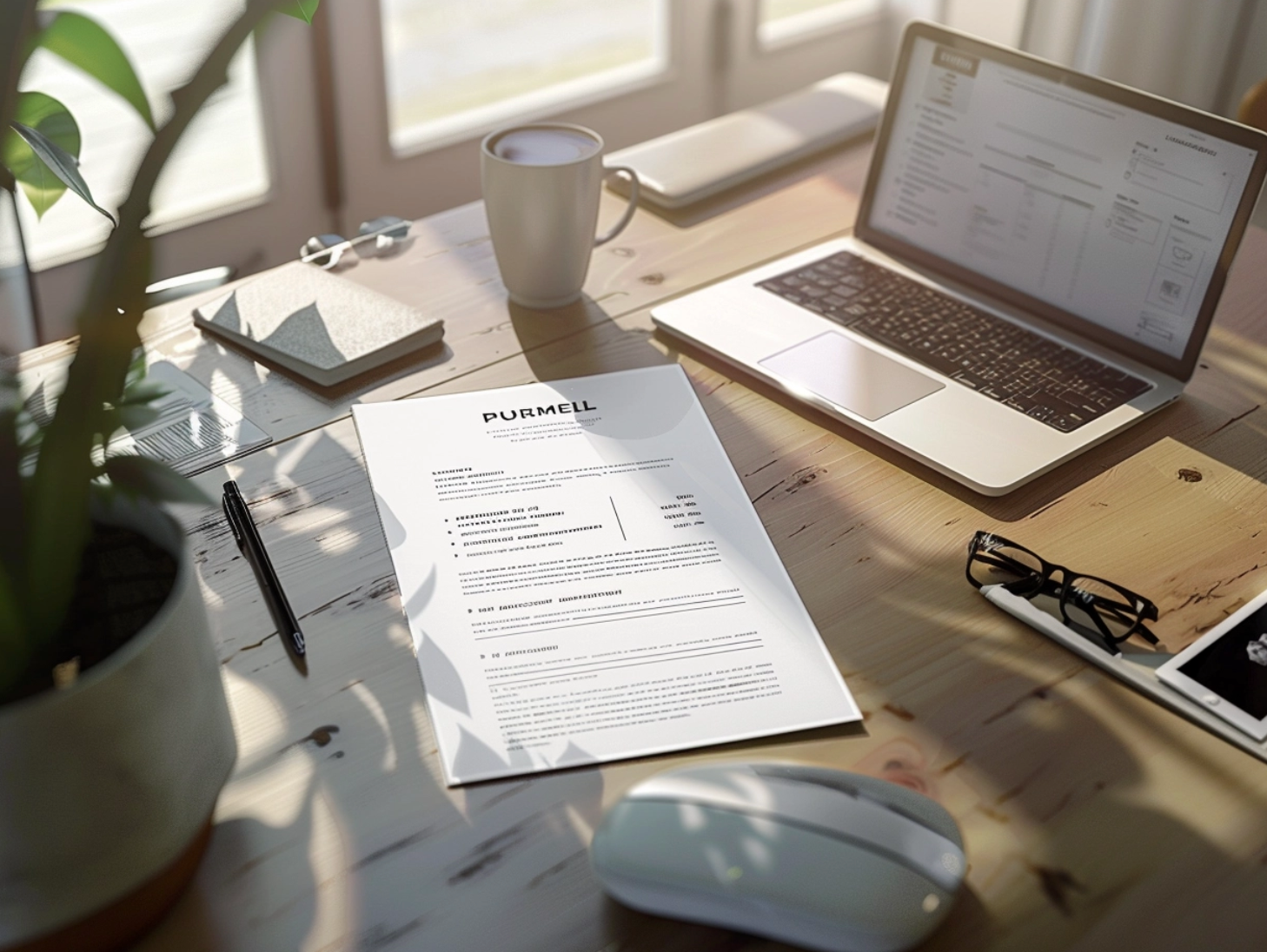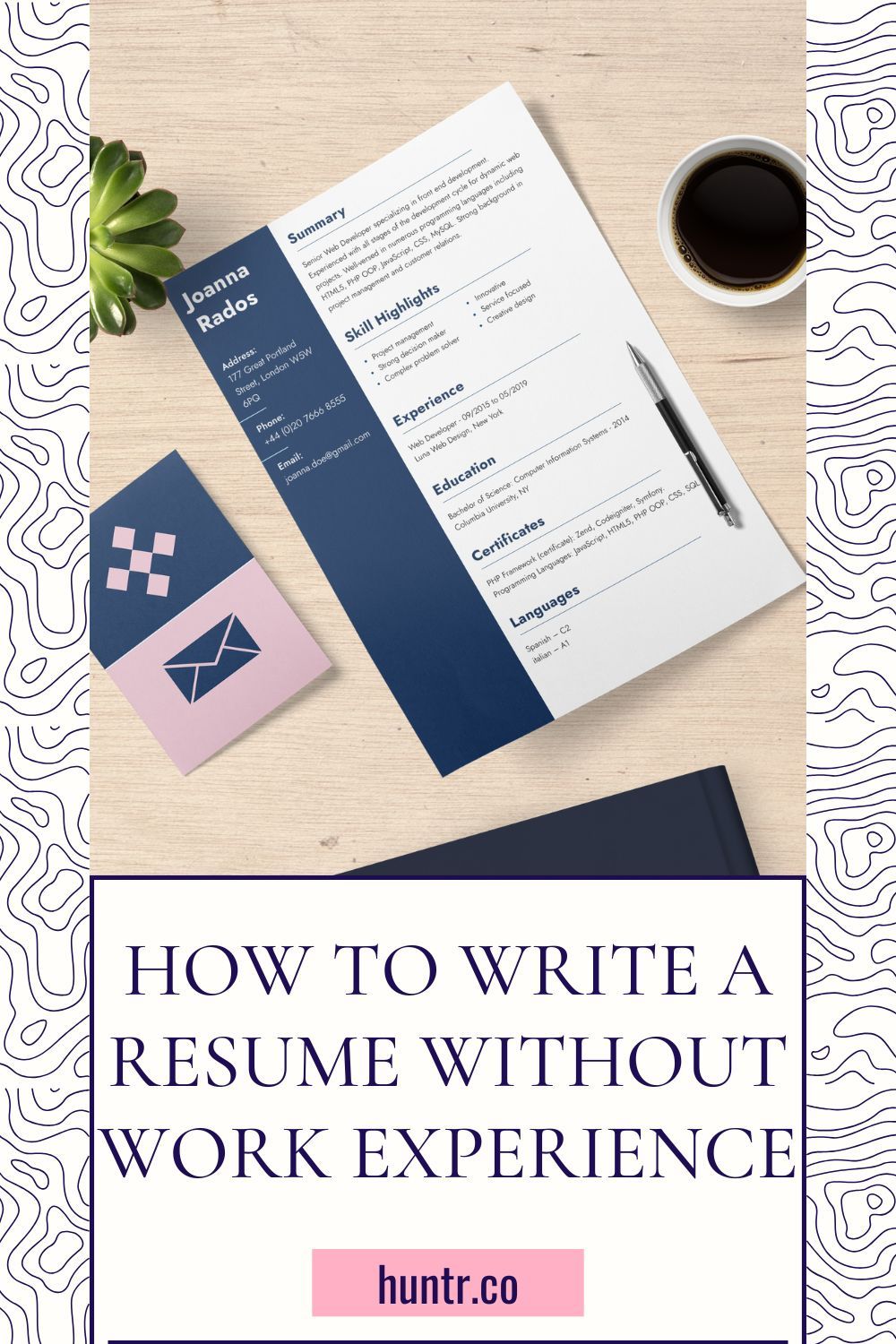If you’re diving into the workforce for the first time, you’ll be creating a resume for the first time. You might be looking at resume examples online only to feel defeated by your lack of work experience. Don’t worry. We’ve got some ideas on how you can pad your first resume to include relevant skills so you can actually get your first job or your first job in a new field. This post will teach you how to write a resume without work experience.
No work experience but you need to write a resume?
Sign up for Huntr to help you generate skills and more to pad out your resume.
How to format a resume without work experience
When creating a standard resume, your work experience is usually the third section after your contact section and resume summary. It’s placed front and center. When creating your first resume or a resume without work experience you might choose to remove the work experience section altogether or reorder your resume in a different way.
Using Huntr, you can reorder your resume in any way you want, making it the best resume builder for those looking to write a resume without work experience. You can even change the titles of sections to include other sections that are a better fit for you as you work on your resume.

How to write a resume without work experience
1. Share your volunteer experience
Many high school and university students with no work experience often have volunteer experience under their belt. To graduate from school, some volunteer work is required to graduate at some schools, allowing you to build that relevant work experience, even if that work for you was unpaid. If you have experience volunteering for charities or other organizations, you might include that experience on your resume to showcase that you do have some experience working in unpaid positions. A volunteer role can highlight various skills, such as communication skills, time management, problem-solving, or even a solid work ethic. They may also be a good reference for you to use when you’re being considered for your first role ever (or in a new industry).
2. Include a relevant internship
If you’re graduating from a college or university, it’s often required for an internship to be completed in order to graduate. This internship is a good experience in a relevant industry you can include on your resume. If you had any accomplishments or wins during your time at your internship you can include it on your resume to showcase that you’re a great entry-level hire for this industry. Like the volunteer experience, you can use your internship boss as a reference during the job search to help you land that relevant role. Using your internship, write resume bullet points about what skills you developed, resume accomplishments you had, and so on to help showcase your ability to do a job.
3. Include a personal statement
A personal statement, resume objective, or resume summary can be added to the top of your resume, just below the header to explain why you're looking for your next role. If this is your first role in the industry, you might explain that you're looking for your first job in the field. You might include a goal you have, share a value that aligns with the company, or share your biggest accomplishment in school, volunteering, or a personal project you worked on. This personal statement should only be a couple of sentences long, even if you don't have work experience on your resume.
4. Highlight your extracurricular activities
In college and universities, there are often many campus clubs and organizations you can join to help you pad out your work experience. They’re often volunteer or unpaid roles, but they can give you valuable experience that may be relevant to help you land your first industry job out of school. For example, planning events at a residence hall could help you land a role as an event planner. Or managing the budget for the student union can help you land your first finance job. Or being the communications coordinator for a club could help you work in public relations or marketing. Ultimately, there are tons of roles in a club that you can apply to which can be added to your resume without work experience while still showcasing you’ve developed some relevant experience.
5. Emphasize your educational background
When you’re creating a resume without work experience it’s crucial to elevate your educational background. Often, a new grad or entry-level resume will include the relevant education experience at the top of your resume. Using Huntr's resume builder, you'll be able to organize your resume in any order so you can highlight your skills best. Once you start building out work experience you’ll put education on the bottom. But if you want to get a relevant job in your field with no work experience you’ll give your degree more prominence. You might include a line for your GPA, particularly if it’s high or if you graduated with honors. You might also include a line or two about the skills you developed or relevant classes you’ve taken that directly relate to the role you’re applying to. You could add keywords that are listed in the job posting in this section as well where it relates to what you learned in the classroom.
6. List relevant courses
While you might not have formal education like a college degree or even high school diploma, you can also list relevant courses you've taken to show that you're qualified for a job. For example, there are so many job training programs that teach you the skills you need to work in tech or other popular industries in only three to six months. You'll not only get the training but also the coaching you need to land your first job, so you can start building your work experience for your resume.
7. Include your key soft skills
On a resume without work experience, you should consider including a skills section. If you haven’t developed any hard skills in your field yet, you could include some soft skills you’ve developed that directly relate to the role you’re applying to. For example, an English major graduate looking to get a role as a writer, might include skills like writing, editing, communication, research, storytelling, creativity, critical thinking, or attention to detail. When it comes to hard skills, if you have developed them through projects, internships, or other methods, you could list relevant hard skills. The skills section will often include a list of keywords. Adding these keywords to your resume is crucial so you can pass ATS filters, even without work experience on your resume.

8. Mention your relevant hobbies or interests
When you have a resume without work experience, you need to highlight the connection between yourself and the role you’re applying for clearly. If you don’t have work experience, you might want to include relevant hobbies or interests to showcase that connection. For example, if you’re applying for an entry-level robotics position as a new grad, you might include building robots as a hobby on your resume. That way, when you have an interview you can either make videos about robots you’ve built or talk about your process in building them to explain your genuine interest in what the company does.
9. Add a link to your portfolio
Just because you don't have any work experience on your resume doesn't mean you've never dabbled in building those skills. For example, an engineer might not have ever had a formal engineering job, but maybe they've built an app, video game, or website from scratch so they've still developed the hard skills required. Having a portfolio shows that you are competent at the job even if you don't have the work experience to show for it.
10. Include any certifications you may have
In some roles specialized certifications are required to be able to do the job. For example, to serve alcohol, you’ll need to be legally allowed to serve alcohol and will need to complete your local certification to get a job as a server or bartender. Alternatively, if you want to drive a forklift on a construction site, you need to have a license to do so. Nurses and healthcare workers might need to do CPR or first aid training among other things. These certifications can all be added to your resume without work experience to show that you’re qualified to do the role. In some cases, getting these certifications aren’t a nice-to-have but mandatory requirement for entering the workforce in that industry. So, adding these to your resume can help you land your first role.
11. List your projects
When you have a resume without work experience, you can share relevant projects you’ve done in that niche to help showcase your capability of doing the job. For example, if you wanted to get a job in ecommerce, you might include an online store you’ve built yourself and generated sales for as a side hustle to showcase your skills in online store management or marketing. It could also showcase your experience using the same software as the company you’re applying for. Alternatively, if you’ve recently completed a coding bootcamp and are looking for your first development job, you might include links to tools or software you’ve built yourself for fun. Side hustles, coursework, or other projects could all be included on your resume to show that you’ve actually done the work before in an informal setting. Maybe you’ve never had a typical job in the field before, but you’re not a beginner when it comes to experience in your craft.
12. List any workshops, seminars, or conferences you attended
Beyond schooling, there are all sorts of industry events where you can attend to learn new skills. For example, there are marketing conferences where you can learn practical tips about what's working in marketing today to help you generate the same results. Adding a section on workshops, seminars, or conferences you attended recently can help position you as someone who stays on top of trends and tactics in your industry so you can continue to evolve and get better. This formal training could help you land your first role too. You can even network with attendees at these types of events to potentially get an introduction at a company.
13. Mention any awards or honors you’ve received
In some cases you may have won awards or special honors that could be included on your resume. For example, a science student could’ve won an award at a science fair. A business student could’ve won 30 under 30 while building a startup in school. A student could have graduated on the honor roll with a 4.0 GPA. Scholarships, athletic awards, grants, leadership awards, academic distinctions, and more could all be included on your resume without work experience to showcase your drive to succeed.
14. Include any professional development you’ve completed
When creating a resume without work experience, you can include any professional development you’ve completed. This could be a course you’ve taken, conferences you’ve attended, seminars you’ve gone to, professional certifications you’ve earned, or any other training you’ve completed. Whether it’s a leadership course or a niche seminar to teach you key skills, you can add professional development to your resume to highlight your key skills. Any certifications you’ve earned from these training sessions could be added to your resume to boost up your content and to showcase how ready you are for your first job in a new field.
15. Share any freelance work you’ve done
On a resume without work experience, you can still include freelance work. Many freelancers have non-traditional jobs but still have developed the relevant skills and experience to help them land roles. Graphic designers, writers, programmers, and more could take on some freelance work to build out their portfolio, gain valuable feedback, and experience. You can find clients online via freelance sites, such as Upwork, Fiverr, 99Designs, and so on. These could be a great starting point for you to develop your experience and skillset on the platform to become a great hire in your niche. Sharing that you’ve had some freelance work on your resume shows that you’ve done and gotten paid for a job before. So it helps showcase that you do have the resume skills to do the job, even if you haven’t formally worked in an office or work environment before.
16. List any professional associations
In many industries, there are professional associations you can join that have membership perks. For example, human resources professionals can join professional human resources associations, which can be added to your resume without work experience. These associations have networking opportunities, such as lunch and learns, holiday events, and so on. They might also have courses or learning opportunities so you can level up your expertise in the industry. These associations show that you’re connected to the industry, are able to connect with mentors or experts in the field, and that you have access to any webinars or professional development courses in the industry.
17. Include any languages you’re fluent in
Adding a language to your resume without work experience can be a great way to land jobs where being bilingual or multilingual is helpful. For example, if you have taken university level French, but have never worked at a company before, you can apply to jobs where being fluent in English and French is a necessity. The language helps showcase one of your qualifications so you can land the job easier than someone who doesn’t have that requirement. Being multilingual can allow you to earn job opportunities for your fluency alone as it’s not too common in some countries.
Build your next resume
It’s not uncommon to have a resume without work experience. Every year new graduates set out to find their first job without any traditional work experience under their belt. If you’re thinking about building a resume without work experience, you can use Huntr’s AI resume builder to get started. With a little help from AI you can fill out your resume, reorder resume sections to emphasize your education or other aspects of your resume, and more. To build your first resume, sign up for Huntr today.

Get More Interviews, Faster
Huntr streamlines your job search. Instantly craft tailored resumes and cover letters, fill out application forms with a single click, effortlessly keep your job hunt organized, and much more...
AI Resume Builder
Beautiful, perfectly job-tailored resumes designed to make you stand out, built 10x faster with the power of AI.
Next-Generation Job Tailored Resumes
Huntr provides the most advanced job <> resume matching system in the world. Helping you match not only keywords, but responsibilities and qualifications from a job, into your resume.
Job Keyword Extractor + Resume AI Integration
Huntr extracts keywords from job descriptions and helps you integrate them into your resume using the power of AI.
Application Autofill
Save hours of mindless form filling. Use our chrome extension to fill application forms with a single click.
Job Tracker
Move beyond basic, bare-bones job trackers. Elevate your search with Huntr's all-in-one, feature-rich management platform.
AI Cover Letters
Perfectly tailored cover letters, in seconds! Our cover letter generator blends your unique background with the job's specific requirements, resulting in unique, standout cover letters.
Resume Checker
Huntr checks your resume for spelling, length, impactful use of metrics, repetition and more, ensuring your resume gets noticed by employers.
Gorgeous Resume Templates
Stand out with one of 7 designer-grade templates. Whether you're a creative spirit or a corporate professional, our range of templates caters to every career aspiration.
Personal Job Search CRM
The ultimate companion for managing your professional job-search contacts and organizing your job search outreach.

